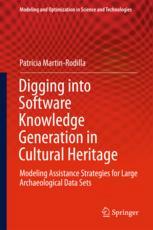

Most ebook files are in PDF format, so you can easily read them using various software such as Foxit Reader or directly on the Google Chrome browser.
Some ebook files are released by publishers in other formats such as .awz, .mobi, .epub, .fb2, etc. You may need to install specific software to read these formats on mobile/PC, such as Calibre.
Please read the tutorial at this link. https://ebooknice.com/page/post?id=faq
We offer FREE conversion to the popular formats you request; however, this may take some time. Therefore, right after payment, please email us, and we will try to provide the service as quickly as possible.
For some exceptional file formats or broken links (if any), please refrain from opening any disputes. Instead, email us first, and we will try to assist within a maximum of 6 hours.
EbookNice Team

Status:
Available0.0
0 reviewsThis book focuses on innovative strategies to manage and build software systems for generating new knowledge from large archaeological data sets
The book also reports on two case studies carried out in real-world scenarios within the Cultural Heritage setting. The book presents an original conceptual framework for developing software solutions to assist the knowledge generation process in connection with large archaeological data sets and related cultural heritage information— a context in which the inputs are mainly textual sources written in freestyle, i.e. without a predetermined, standard structure.
Following an in-depth exploration of recent works on the knowledge generation process in the above-mentioned context and IT-based options for facilitating it, the book proposes specific new techniques capable of capturing the structure and semantics implicit in such textual sources, and argues for using this information in the knowledge generation process.
The main result is the development of a conceptual framework that can accommodate textual sources and integrate the information included in them into a software engineering framework. The said framework is meant to assist cultural heritage professionals in general, and archaeologists in particular, in both knowledge extraction and the subsequent decision-making process.